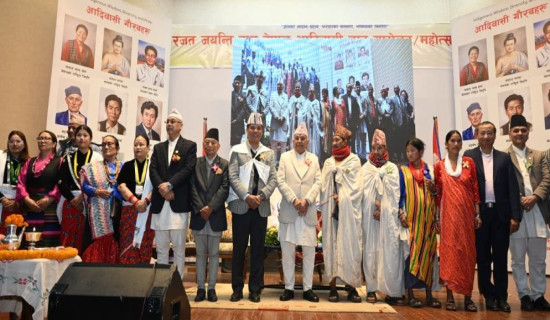- Monday, 9 February 2026
54th Earth Day calls for urgent action
Kathmandu, Apr. 22: As we celebrate 54th Earth Day on Saturday, Mother Earth is calling for urgent action to protect herself from raging wildfires, extreme heat and floods, ocean filling with plastics, among other disasters which are affecting millions of people.
Deforestation, land use change, intensified agriculture and livestock production, illegal wildlife trade, and man-made changes to nature as well as global warming are destroying the planet, and time has come to rectify the mistakes made in the last many decades, experts said.
The earth is environmentally degrading in an alarming way, and many water sources are drying up rapidly due to haphazard infrastructure development, depleting ground water recharging and deforestation,” said Dr. Ram Devi Tachamo-Shah, Assistant Professor at the Kathmandu University’s Department of Life Science.
Intergovernmental Panel on Climate Change (IPCC) also warned that despite all mitigation efforts, the earth’s climate continues to get warmer and is likely to reach 1.5°C anytime between 2030 and 2035. To stop it from rising above this limit, greenhouse gas and CO2 emissions must be reduced by at least 43 per cent by 2030 and at least 60 per cent by 2035 (compared to 2019 levels).
Nepal has been witnessing extreme climate events such as floods, landslides and many other disasters over the past few years. Many organisations, including government bodies, are working to make people aware of environmental protection and conservation. But its effectiveness has yet to be seen.
To protect the planet from further damage, our children should be educated on the environment and conservation, said Dr. Ghana Shyam Gurung, Country Representative of the World Wildlife Fund (WWF) Nepal.
WWF is focusing on school children about environment-friendly education, making them responsible for environmental protection and conservation, he said. For this, ‘Green School Guideline’ was started in 2018 with an aim to promote conservation education in government schools across Nepal and build awareness and engagement of school-level children in conservation, Dr. Gurung said.
The eight-part guideline was formulated to promote the concept of “One Garden, One School” and schools as a Living Laboratory while engaging school children in conservation awareness and tree plantation programmes.
The guidelines were implemented with coordination between the local, state and federal governments, school management committees and development and conservation agencies in Nepal, he said. “There are 960 Eco Clubs from across the country and they will participate in a programme in Chitwan to mark the Day. We will make a commitment on Saturday to implement the guideline effectively,” Dr. Gurung said.
The WWF is also planning to make the school waste free by 2030 and all schools will be made carbon neutral after 2030, he added.
“WWF Nepal launched its conservation education programme in 1994 with the establishment of its first eco-club in Bardia. The Green School Guideline cements our efforts to bring conservation education to children from a young age,” Dr. Gurung. “The programme has grown further to engage young people through the “Generation Green” campaign that aims to build a generation of youth committed to conservation and sustainable development in Nepal.”
Ajay Karki, Deputy Director General at the Department of National Parks and Wildlife Conservation, said that the earth and biodiversity are interconnected and that protecting the biodiversity means protecting the earth. In this Triple planetary crisis, every stakeholder and people from every walk of life should join hands to protect the planet for many generations to come.
Anil Keshary Shah, a well-known banker, said that there is a need to switch to clean and renewable energy to protect our mother earth. “We have ruined many things on earth in the last half-century, but it’s never too late to correct the mistake. We can plant trees, clean rivers, and oceans, protect biodiversity and protect the springs for future generations. So we need to teach children to feel responsible towards the earth.”
Through the guideline, WWF is encouraging school children to have a garden of medicinal herbs and a variety of fruits and bio-fence,” he added.
Earth Day this time is being celebrated across the globe with the theme “Let’s promote harmony with nature and the Earth”.








-square-thumb.jpg)








